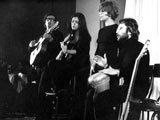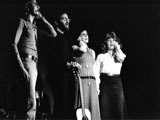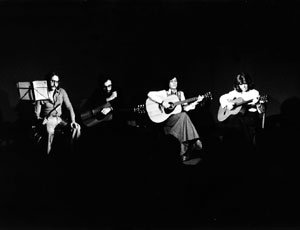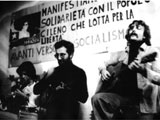Gruppo Folk Internazionale
|
Mara Cantoni
Mariuccia Colegni Moni Ovadia Enrico Sassoon |

|
Fame is recent but the group has worked together for many years; four young people involved in a cultured and exact research of the most authentic popular roots of traditional tunes both old and new.
From the ballads of Anglo-Saxon mariners, to the songs of Slav farmers and Jews in the Tsarist ghettoes, to South American people's dances, all this and more makes up the GFI's repertoire. (...) (from a concert program, 19 december 1973) |


|
For a week, fifteen years later, space and time took a kind of break, and in an eerie snow-clad Milan some old friends and many instruments were seen gathering in a place on Viale Monza....
Mario Arcari |
To play, to sing... Unghie rosse!
We sang. Of work, of struggle, of love.
We sang in many different tongues.
We sang of Internationalism,
unaware of the globalization to come (see).
We sang at school, in the basement, at table after dinner.
We were in good company. We discussed.
We planned a co-operative.
We played guitars and mandolins,
the banduria and the concertina,
block-flutes and Irish whistles and spoons.
We believed. We had fun.

|
For three of us it all started at our school-desks. Several concerts later, after having been called with our own names and then Gruppo Folk Milano (Circolo De Amicis, 18 april 1972), we became the Gruppo Folk Internazionale, a name which described both our repertoire and the Utopia it represented far more adequately.
For me, it lasted yet a few seasons. Singing and song-writing on the one hand, and the Opera on the other, took me towards my research for a new musical theatre. I do owe to the knowledge of the popular repertoire and its relative facility of execution, the idea of music played “in movement”. |